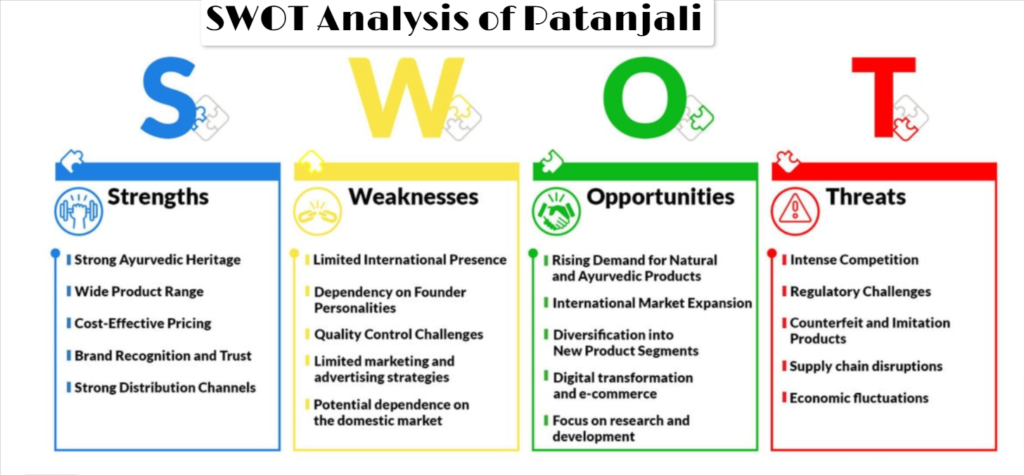Patanjali Ayurveda Ltd. was a small-scale pharmacy. It has however brought about revolution in the world of consumer goods. It has earned a prominent place within its position in the FMCG industry in India. Patanjali is a combination of traditional health products as well as contemporary wellness items. The high-quality products offered at reasonable costs have created a massive client base that comes from all walks of society.
Patanjali: An Overview
Baba Ramdev and Acharya Balkrishna established Patanjali in 2006. Its headquarters are at Haridwar, Patanjali company specializes in manufacturing Ayurvedic products. Its range of products includes health supplements and supplements as well as home care items, shampoo, toothpaste, noodles biscuits, juices and biscuits products for skin care, and spices. products.
They sell their products at shops and online platforms. Patanjali operates state-of-the-art facilities at the manufacturing facilities in India. The company is focused on the high-quality the products it produces. In the production of its products, the company makes use of minimal artificial and chemical additives.
Patanjali Company Details
| Name | Patanjali Ayurved Ltd |
| Headquarters | Haridwar, Uttarakhand, 249401 |
| Industry | Consumer Packaged Goods |
| Founded | 2006 |
| Founders | Acharya Balkrishna, Baba Ramdev |
| Website | www.patanjaliayurved.net/ |
SWOT Analysis of Patanjali
Strengths of Patanjali
#1. Baba Ramdev, the Founding Father: Baba Ramdev, a well-known yoga instructor with Acharya Balkrishna, who was a scholar of Ayurveda established Patanjali Ayurveda Ltd. Patanjali’s relationship and Baba Ramdev has helped to accelerate the growth of the business. In addition, he is the brand ambassador for Patanjali. His fame and acclaim and the quality of Patanjali’s products and affordable prices has made Patanjali a popular brand in the United States.
#2. Cost Strategy Structure cost of the Patanjali products is between 20 and 30 percent lower than the prices of its other competitors. This strategy of pricing has allowed the company lead its share of the FMCG market. These products are priced to be affordable for middle and lower-income consumers.
#3. Ayurvedic Heritage: The rich Ayurvedic heritage is among the biggest advantages of Patanjali. Customers who want natural products are pleased by Patanjali products. The Ayurvedic culture, deep embedded in Indian tradition, provides Patanjali an advantage that is unique.
#4. Diversified Portfolio sales strategy involves the promotion of natural products. It emphasizes the advantages of natural and organic products. The authentic Ayurvedic formulas, which the ones that the Patanjali company has integrated has been able to give it an edge over its competition.
Weaknesses of Patanjali
#1. A low number of manufacturing units The demand for Patanjali’s products is rising. However, there is only a few factories within Haridwar as well as Nepal. The apparent dearth of factories isn’t enough to meet the increasing demand for the goods.
#2. Rural brand: Patanjali has an image as a brand that is rural. This image might limit its appeal to customers from urban areas. Urban consumers aren’t able to adopt the ideals of the brand.
#3. Low Margin for Distributors Patanjali’s pricing system makes it difficult for collaborations and partnerships to be formed. They cannot make money through their services. While competitive rates are beneficial to customers, they can also destroy relationships.
#4. International Presence Baba’s popularity and Ayurved’s worldwide demand however, Patanjali’s reach internationally is very limited. The brand has to broaden its presence to the global market in order to create an international wellness movement.
Opportunities of Patanjali
#1. Electronic Commerce: Patanjali can use digital technologies to enhance the user experience for its supply chain as well as operational efficiency. In addition, it is able to learn about the behavior of customers. Patanjali can reach global customers ignoring geographical barriers via e-commerce.
#2. Strategic Partnerships Patanjali is partnered together with Future Group. Therefore, Patanjali has the opportunity to join contemporary retail chains. The partnership has increased its presence online and also provides a template for future collaborations.
#3. Research and development: Patanjali is a leader in research and development. Research and development that is thorough ensures that the products are of high-quality.
#4. Introduction to the Luxury Market: Patanjali is working on the research and development. It is likely to become a luxury brand along with its herbal and natural product, Patanjali may dominate the market for luxury.
Threats of Patanjali
#1. Environmental Beacons: Patanjali needs to evaluate its packaging and sourcing practices. It needs to adapt to the environmental concerns of today because our modern society is increasingly geared toward environmental sustainability.
#2. The Controversies Patanjali was involved in numerous controversies due to product claims. For instance, the advertisement campaign for ‘Putrajeevak was a cause for national debate in the eyes of Indians. This product ensured the birth of the male baby. This scandal tarnished the reputation of the brand.
#3. Negative Publicity Negative Publicity Nepal Department of Drug Administration identified several of Patanjali’s medical items as not up to norms. Patanjali was a target of severe accusations when the microbiological test result was not positive.
Conclusion
We can say that the primary strength of Patanjali is the reputation of Baba Ramdev. Additionally, its pricing policy allows the brand to outdo its rivals. Additionally, its Ayurvedic products are organic and organic, and have appealed to a loyal client base. Through an SWOT review of Patanjali it is possible to discover its strengths and weaknesses, potential opportunities and threats.

